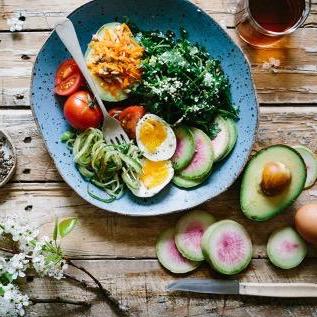
Best Food Groups for Muscle Growth

Best Food Groups for Muscle Growth
In order to maximize muscle growth, you must optimize your diet. After all, as the saying goes:
“90% of your gains are made in the kitchen!”
Not only can a poor diet minimize results, but it can actually be detrimental to your results. Instead, by putting your body through physical activity and fuelling it with the proper nutrition to support muscle growth, you put yourself in the best position to build quality lean muscle.
In what follows, you’ll discover the best food groups for building muscle. In addition, you’ll be provided with key examples of foods to avoid and foods to consume on the path to muscle growth. Lastly, you’ll learn the science of nutrition and how to optimize it for any goal.
Calories vs. Macronutrients for Muscle Growth
When seeking to build muscle, nutrition plays a major role in your success. While many have a false notion that building muscle simply requires lifting weights and “pumping iron”, 90% of gains are made in the kitchen.
In order to build muscle, we must fuel our muscles with not only the right foods but the proper amounts of the right foods. This can be a tricky calculation at first, however, once you have an understanding of caloric intake and macronutrients, nutrition becomes clockwork.
In short, when trying to gain muscle, our bodies need to be in a caloric surplus. This is a phase where you consume more than what you need to simply maintain your current weight.
Additionally, not only do you need to get the calorie equation correct but you need to nail down the proper macronutrient ratio as well!
In summary, there are three macronutrients: Protein, Carbohydrate, and Fat. While this may vary from person-to-person, a general recommendation for building muscle are the following ratios:
- 30% of calories from protein
- 55% of calories from carbs
- 15% of calories from fats (healthy fats, of course)
If all else fails, ensure that you’re getting enough protein in your diet. Protein is known as the building blocks of the body and it’s what allows our muscles to repair, rebuild, and grow.
Key Food Groups for Muscle Growth
When it comes to muscle growth, nutrition is king. However, nutrition should always be king, big muscles or not…
As such, your diet shouldn’t change in terms of the foods you consume. Instead, only the amounts in which you consume them should change. With that being said, the following are the healthiest, most effective, nutrient-dense food groups to consume on your journey to building muscle.
Note, though, that these food groups are also the healthiest food groups for general health too!
Food Groups Optimal for Building Muscle and Remaining Healthy:
- Meat, Poultry, and Fish
- Dairy
- Grains
- Fruits & Vegetables
- Nuts and Seeds
- Beans & Legumes
- Healthy Oils
While not all of these food groups need to be included in one's diet (due to dietary limitations, allergies, preferences, etc.), generally speaking, this is the best list to choose from.
Now that the food groups have been noted, the better question becomes: What foods of these food groups should you avoid, and what foods should you consume?
Foods to Consume
If your primary objective is to build lean muscle, focusing on regular exercise in conjunction with eating more of the right foods will put you well on your way to accomplishment.
Below are some of the best examples of foods that you should consume during a muscle-building phase:
- Eggs
- Salmon
- Chicken
- Lean Beef
- Greek Yogurt
- Beans
- Protein Powder
- Quinoa
- Tuna
- Almonds
- Whey Protein Supplement
While this list certainly doesn’t cover it all, it’s definitely a great place to start. Obviously, if you’re a vegan or vegetarian, for example, this list can change quite drastically. As such, you’d likely consume more fibrous vegetables, beans and legumes, and focus on getting your protein from sources outside of animal meat.
Nonetheless, as a general rule, consume meats and vegetables, nuts and seeds, some fruit, little starch, and no sugar.
Foods to Avoid
Speaking of which, the number one food to avoid is sugar!
Ok, well, sugar isn’t a food group. However, avoiding foods that contain high amounts of unnecessary added sugar will not only be a detriment to your gains, but also to your health.
Other foods (or beverages) to avoid are:
- Alcohol
- Anything with added sugar (cereal, cookies, doughnuts, ice cream, soda)
- Deep-Fried Foods (fries, onion rings, chicken strips, desserts)
- High Fat Foods (butter, heavy creams, fatty cuts of meat)
Look, life is meant to be lived….
However, when you’re prioritizing a particular goal, like building muscle, for example, rules and regulations need to be implemented. As a quick note, try and live by the 80/20 rule. That is, try and do right 80% of the time, and allow yourself to indulge 20% of the time, generally speaking. The more you restrict yourself and increase the 80% side of the ratio, the greater the results you’ll reap.
In Summary
If you stick to the following sentence, you’ll do just fine on your quest to building muscle. This sentence not only covers the basics when it comes to the best food groups for muscle growth but also provides you with a blueprint for general health.
So, the next time you’re wondering what a proper diet looks like, simply repeat the following: ‘lean meats and vegetables, nuts and seeds, some fruit, little starch, and NO sugar.’
In summary, your diet should be packed with nutrients; you should aim to consume 25-30 grams of protein with each meal; and you should restrict bad food choices 80% of the time, and that includes alcoholic indulgence.
This ensures that your body receives all that it needs for optimal muscle building and general overall health!





